If you’re asking yourself, “Can I live in my house during foundation repair?” the answer is yes! But it’s not without its challenges. In this article, we’ll discuss some of the common questions and concerns people have about living in their homes while it’s being repaired. We’ll also provide some tips on how to make the process go as smoothly as possible. So if you’re facing a foundation repair project, read on!
The Repair Process
The foundation repair process can begin as soon as you notice any issues with the stability of your home’s foundation. In some cases, this may include cracked walls or floors, sloping floors and other signs of structural damage. If you are unsure if there is a problem, it’s best to call in an experienced contractor who can inspect the structure and determine if repairs are necessary.
Once the scope of the project has been determined and a plan for repairs is established, your contractor can then move forward with the job. Depending on the severity of the damage, this could involve anything from simple patching and filling to more extensive excavation and reinforcement work. This process may require heavy machinery or chemical treatments to stabilize soil conditions and can take anywhere from a few days to several weeks.
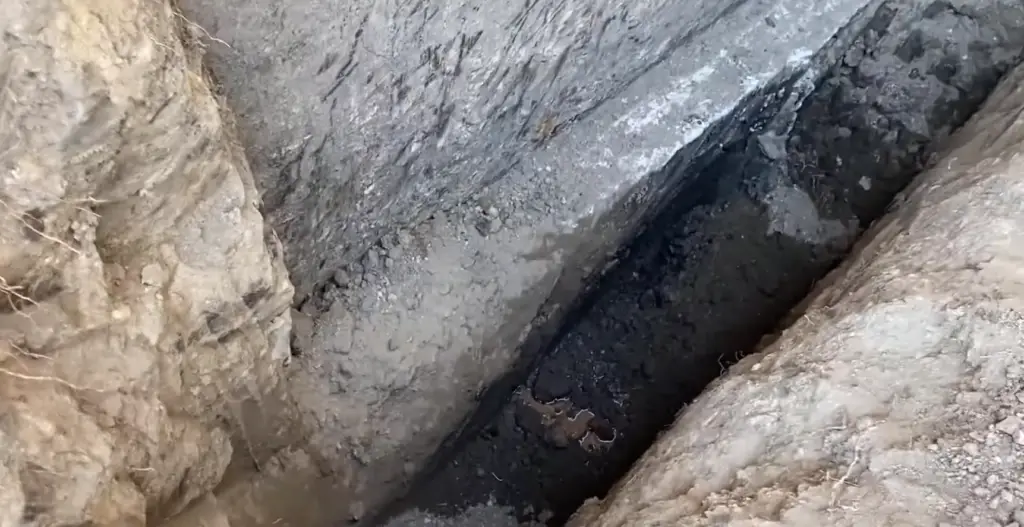
During this time, it is possible to stay in your home while the repairs are being completed, but there may be some limitations and safety concerns to consider. To ensure your safety and the effectiveness of the repairs, you must follow the instructions given by your contractor or engineer at all times.
Is It Safe to Remain in Your Home During Foundation Repair?
Generally, it is safe to remain in your home during foundation repair. However, there are certain precautions you should take.
Second, keep an eye out for environmental hazards like mold or asbestos that could have been disturbed by the repairs. If you’re concerned at all, contact a qualified inspector who can assess whether these hazards are present before the repair work begins.
Finally, be aware that you may experience some noise and vibrations while foundation repairs are taking place. Make sure to keep your family safe by keeping windows and doors closed during noisy times of the day and informing everyone in the house about potential hazards when heavy equipment is being used.
When done correctly, foundation repair can be a great investment for your home both now and for years to come. With proper safety precautions in place, there’s no reason why you shouldn’t remain comfortably in your home during the repair process!
Why Some Homeowners Choose to Leave
While some homeowners choose to stay during their home’s foundation repair, others prefer to leave. This can be for a variety of reasons such as not wanting to expose themselves and their family to the dust and debris generated by the work being done, or simply the noise of construction which can be disruptive. Additionally, some prefer to vacate because they don’t feel comfortable allowing strangers in their homes while they are away.
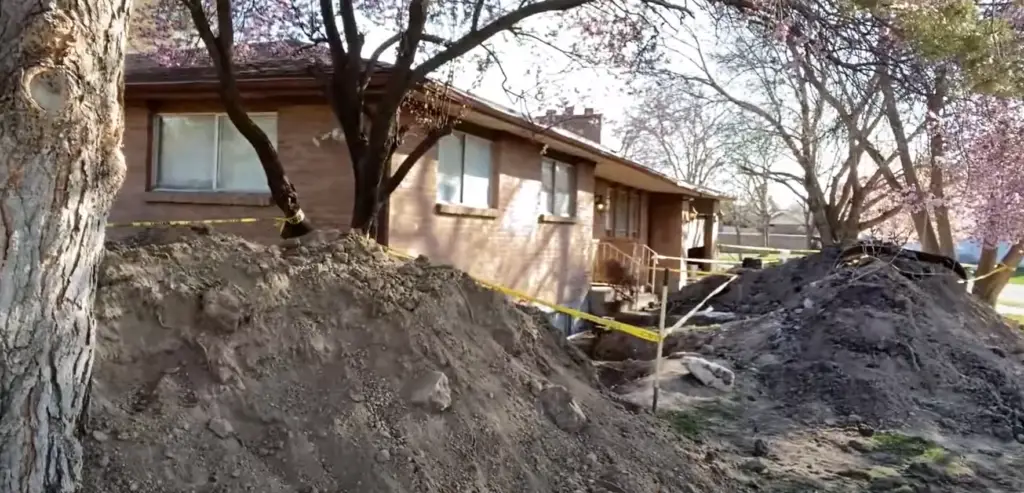
No matter what your reason is for needing to move out temporarily, it’s essential to understand that this type of situation does require some extra planning and consideration. To help make it easier for you, here are a few tips if you decide that leaving is the right choice for you:
- Start looking for a temporary rental in advance. This will give you time to find the perfect place that meets all your needs and is within your budget.
- Take essential items with you when you leave, such as clothing, toiletries, important documents, etc.
- Make sure that your home’s insurance policy covers any damages incurred while it is undergoing repairs.
- If possible, consider staying with family or friends while your home is being worked on.
- Have an agreement in writing between yourself and the contractor outlining their job duties and payment terms before beginning any work on the project.
Hopefully these tips have been helpful in making the decision of whether or not to stay during foundation repair easier.
What Is Exactly Going to Happen During the Repairs?
The repairs are going to vary depending on your plan and the type of foundation you have. Some common types of repairs include:
- Adding extra support beams.
- Excavation around the perimeter to make sure that water isn’t seeping into the foundation.
- Pouring more concrete or grout underneath the foundation in order to fill in cracks and weak spots.
- Installing a French drain (or some other kind of drainage system) to protect against flooding.
These are just a few common repair jobs that might need to be done, but depending on the severity of your foundation damage, there could be other steps too. Your contractor should be able to give you an exact list once they’ve assessed the condition of your foundation.
It’s important to note that depending on what kind of repairs you need, some parts of your house may need to be closed off and inaccessible while the repairs are being done. Because of this, it’s best to plan ahead and make sure that any rooms that could potentially be blocked off have all the necessary items moved out beforehand. You should also make sure to check in with your contractor regularly throughout the repair process to ensure that everything is going smoothly and as scheduled.
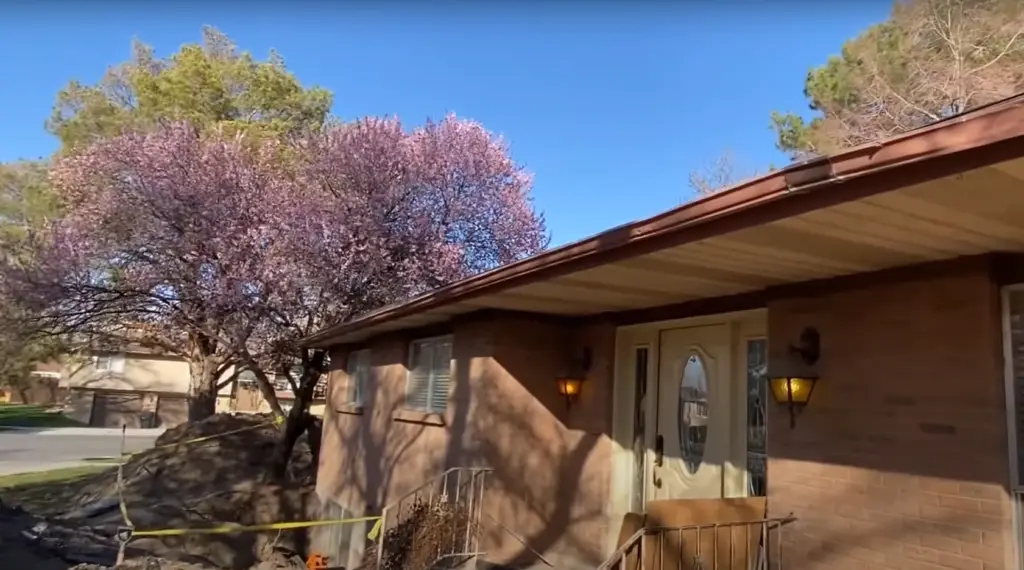
What If You Need More Extensive Work Done?
If your foundation needs more extensive repairs, it’s likely that you won’t be able to live in the house during the entire process. If a complete overhaul of your foundation is required—which could involve installing a new slab or completely replacing existing walls and support beams—it may take several weeks or even months for the entire project to be completed. During this time, you’ll need to find other living arrangements either temporarily or permanently.
Even if you’re only doing some minor repairs, such as patching cracks in foundation walls and filling voids beneath slabs, these types of jobs can also require a significant amount of work which might not make it safe or possible for you to remain in the property while they are being completed.
It’s important to remember that foundation repairs are serious business and should be taken seriously. Your home is a major investment, and you need to make sure that it is structurally sound so that it can last for many years to come.
You should talk to your contractor about the scope of the work they will be doing, as well as any risks or safety concerns associated with living in your home while the repairs are being made. They may suggest that you move out until the job is done, just for your own safety and peace of mind.
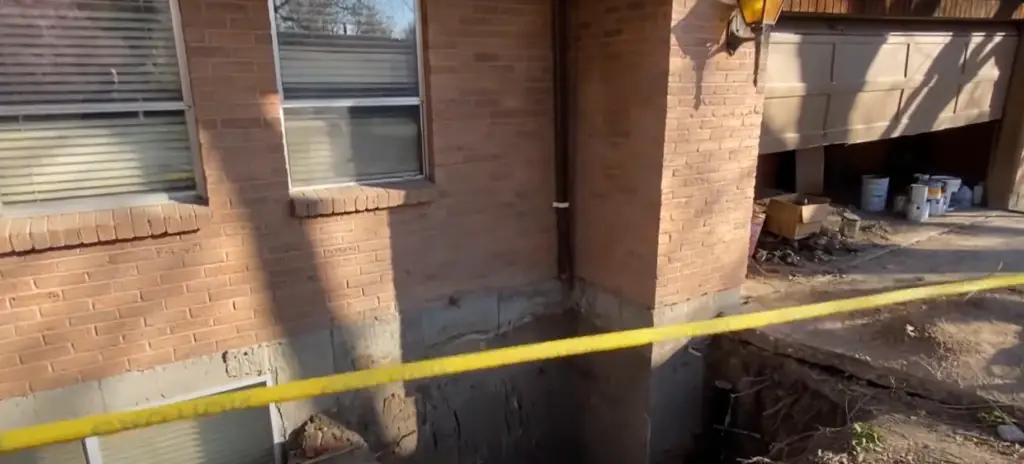
If you do decide to stay in your house during foundation repair work, there are some basic steps you can take to help ensure everyone stays safe:
- Make sure the contractor and their team follow all safety protocols while working on your foundation.
- Set up warning signs around the area that is being worked on to alert you when people are in the house.
- Keep children and pets away from any equipment or materials that are being used for repairs.
- Wear protective gear if necessary, such as a dust mask and eye protection, to protect yourself from debris.
- Maintain good ventilation throughout the process by opening windows or using fans to keep air circulating. [1]
Consider Insurance for Foundation Repairs
If you have decided to live in your house during the foundation repairs, it is important to consider insurance. Having an insurance plan in place can help protect against any unexpected costs associated with a foundation repair. It may also provide peace of mind that you are covered should something go wrong while the project is being completed. Be sure to discuss insurance options with your contractor and your insurance company so that you understand what type of coverage is available for such projects. You don’t want to be stuck with a hefty bill if something does go wrong during the repair process.
Also, it may be beneficial to ask questions about warranties or guarantees offered by contractors for their work. In this way, you can make sure that any issues related to the foundation repair are covered by the contractor if they arise in the future. This way, you know that your investment is protected and can rest easy knowing that your home will be repaired to a high standard and any issues arising from the repair process will be taken care of.
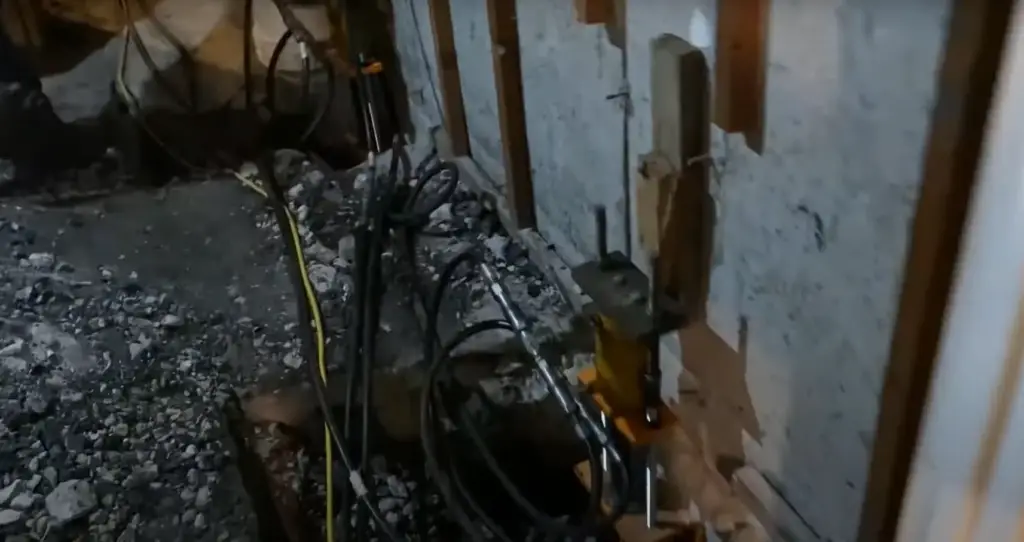
Living in your house during foundation repairs may seem like a daunting task but with proper planning, insurance coverage, and peace of mind, it can also be an empowering experience. Knowing that you have taken all the necessary steps to ensure a successful project will give you reassurance throughout the repair process. So don’t let fear stop you from taking on this project – take action now and secure yourself for success!
Why Does My Home Have Foundation Problems?
A number of factors can contribute to foundation problems — from extreme weather conditions, to poor building practices during construction, or even simple wear and tear over time. Understanding what’s causing your foundation issues is an important step in getting them resolved quickly and safely.
Some common causes of foundation problems include:
- Poor soil composition or soil movement caused by a nearby water source like a pond or stream.
- Improperly compacted soil during construction, leading to shifting foundations.
- Poor drainage around the perimeter of the house, leading to pooling water at the foundation.
- Extreme weather conditions, such as heavy rain or flooding
- Poor building practices during construction, such as inadequate footings for support.
- Leaking pipes that cause soil erosion around the house’s perimeter.
If you suspect your home has a foundation issue, it’s important to contact an experienced professional to assess the problem and work with you on potential solutions. That way, you can ensure that any repairs are done quickly and correctly.
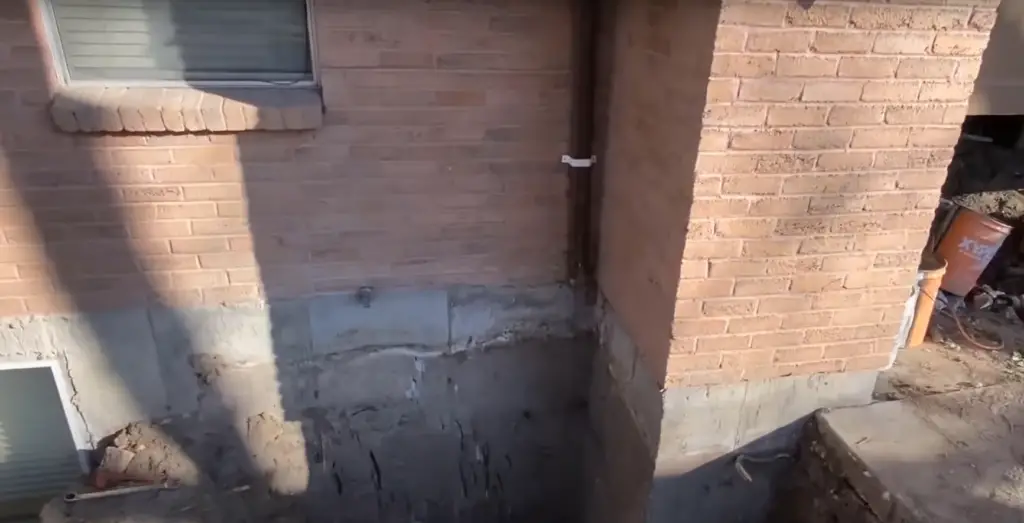
FAQ
What happens to a building with a poor foundation?
When a building has a poor foundation, it can lead to major structural issues. These include the walls becoming bowed or bent, buckling of the flooring, and uneven settling of the home on its foundation. Poor foundations can also cause cracks in drywall and masonry, as well as problems with doors and windows not operating properly. If left unchecked, these problems will only get worse over time and could eventually result in unsafe living conditions for occupants of the building. It’s important that any problem with a home’s foundation is addressed promptly to avoid further damage or injury from occurring. [2]
Will water next to the house foundation cause a problem?
Water near the foundation can be a major cause for concern, especially if there is standing water next to it. Standing water can cause soil erosion and weakening of the structure which will require more extensive repair. If you have any standing water around your home, contact a foundation expert as soon as possible so they can assess the damage and recommend options for repair or mitigation.
In addition to checking for standing water, make sure that your home’s drainage system is working properly. Have a professional inspect all downspouts and gutters in order to ensure that they are free from clogs and debris. This will help keep rain and other moisture away from your foundation, preventing further damage.
It’s also important to make sure that your property is graded correctly. This means any natural slopes should direct water away from the foundation, rather than towards it. If you need assistance with this, contact a professional landscaping company who can help create adequate drainage systems for your home’s environment. [3]
Finally, remember to check for any leaks or wet spots near the exterior of your home. Even if there is no standing water present, these issues often indicate potential problems that could impact the integrity of your foundation in the long term. Make sure to have a professional inspect and resolve any issues as soon as possible to prevent further damage.
How long does it take a house to settle after foundation repair?
The amount of time it takes a house to settle after foundation repair depends on several factors, such as the severity of the damage and the type of foundation used. Generally speaking, houses with more severe foundational damage take longer to settle than those with minor problems. It usually takes anywhere from six months to two years for a house to fully settle after foundation repair. During this period, you should be careful not to add any additional weight or pressure that could slow down the process.
You should monitor your home regularly for signs of continued settling and contact a professional if any new problems arise.
Should I walk away from a house with foundation issues?
Typically, foundation issues are not an automatic deal breaker. Many homes have minor foundation problems that can be resolved with some simple repairs. If the issue is more severe, however, it could require a significant amount of time and money to fix.
If you’re looking at a property or have one you already own and the problem is serious enough to be a deal-breaker, then it may be best to walk away from the home. It’s important to take into consideration your budget, the severity of the damage, and whether or not you’ll need financing for any repair work.
It’s also important to consider how comfortable you are living in a home with foundation problems. Some issues may require extensive excavation, which could cause disruption to your daily routine. If the problem is severe enough, it may even be unsafe to stay in the home during repairs. [4]
Ultimately, the decision whether or not to walk away from a house with foundation problems is up to you and depends on numerous factors. Consulting with a professional who can assess the damage and provide guidance on what needs to be done is always recommended. Doing so will help you make an informed decision about the future of your property.
Useful Video: Foundation Repair On A Sinking House With 40 Push Piers
Conclusion
In conclusion, it is usually possible to remain in your home while foundation repairs are taking place. However, depending on the severity of the damage and type of repair needed, a professional will be able to advise you if it is safe for you and your family to stay in your property during the process.
If staying in your home during foundation repairs isn’t an option then don’t worry – there are plenty of ways to make sure that you can still get the most out of this experience. Whether it’s staying with friends or family, booking into short-term rental accommodation, or even setting up camp at a nearby campsite; there’s always a way to make sure that you can enjoy some of the benefits of living in a house while repairs are taking place.
Foundation repair is an important process that can help protect your home and ensure it remains safe and secure for many years to come. With the right advice, you can make sure that this experience goes as smoothly as possible, allowing you to get back to the safety and comfort of your home sooner rather than later!
Ultimately, if you have any questions or doubts about whether it’s safe for you to stay in your house during foundation repair contact a professional who will be able to provide more information and guidance on what is best for you and your particular circumstances. Good luck with your foundation repairs!
References
- https://www.granitefoundationrepair.com/staying-home-foundation-repair/
- https://www.peakstructural.com/resources/foundation-repair/4-dangers-of-neglecting-your-foundation/
- https://foundationrepairs.com/can-standing-water-damage-foundation/
- https://www.eppconcrete.com/when-to-walk-away-from-foundation-issues/





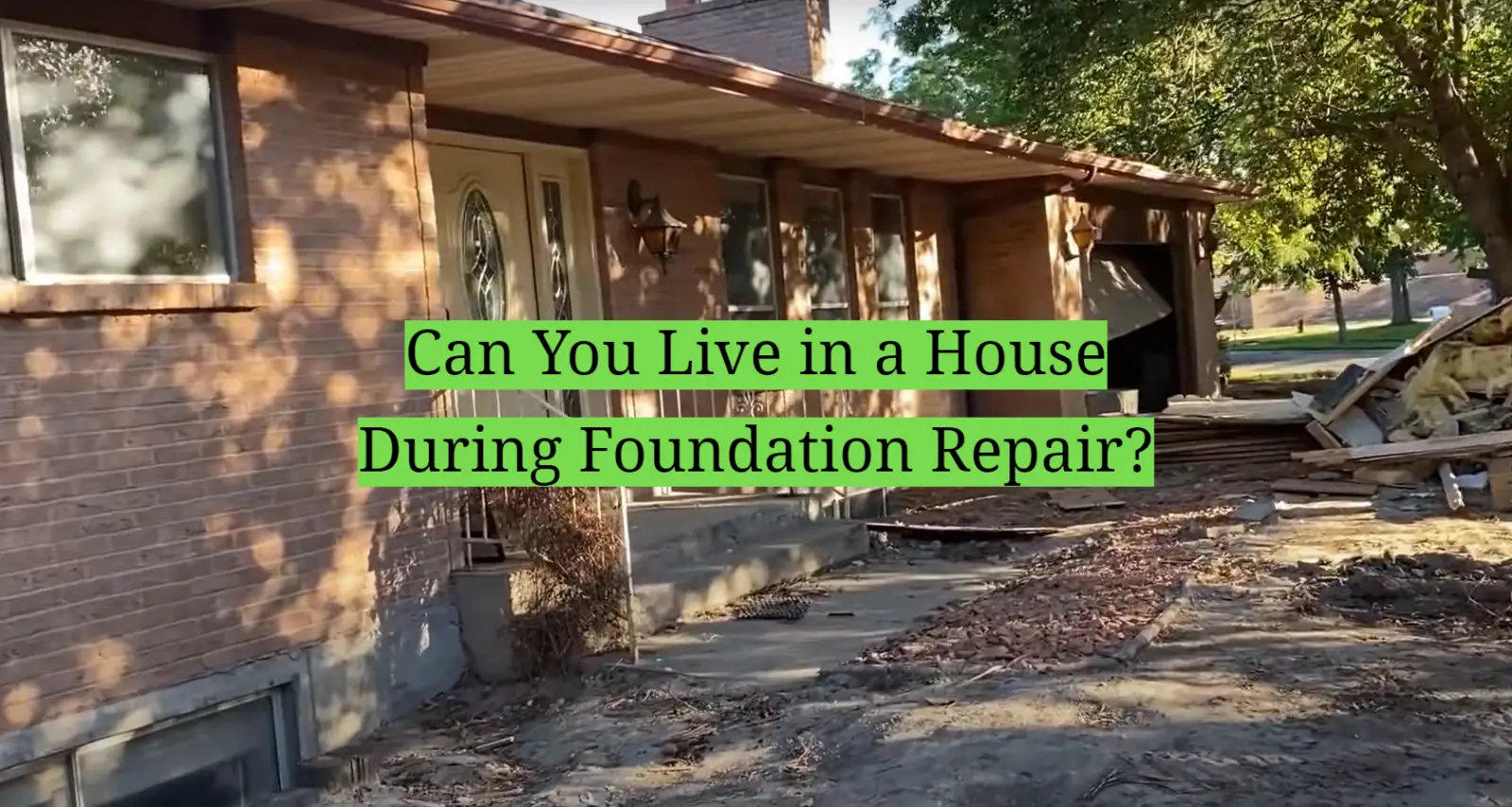





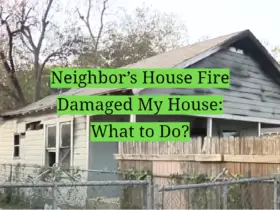


Leave a Reply